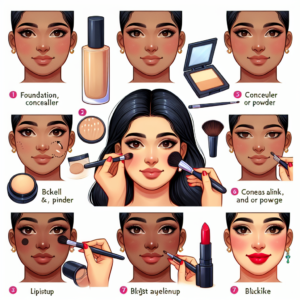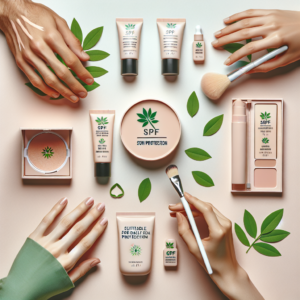
Discovering the Best SPF Solution for Your Sensitive Skin
When it comes to sensitive skin, every product matters. Your skin is like a sponge, absorbing whatever you apply to it, which is why choosing the right SPF is crucial. You need something that protects without causing irritation or harm. Whether you’re stepping out for a grocery run or spending a day at the beach, your sensitive skin deserves the best care. Let’s find the SPF that not only shields you from harmful rays but also feels like a soothing hug for your skin.
Why SPF is Non-Negotiable for Sensitive Skin
Think of the sun’s rays like a relentless drumbeat, pounding down on your skin’s delicate surface. For those with sensitive skin, this isn’t just a nuisance; it’s a serious risk. Sun protection factor, or SPF, isn’t just a suggestion—it’s your skin’s best friend. It’s the barrier that stands between you and the sun’s damaging ultraviolet (UV) rays, which can lead to sunburns, premature aging, and even skin cancer. And for sensitive skin, the stakes are even higher. The right SPF can make the difference between a day filled with comfort or one filled with discomfort.
Vegan SPF: What Does it Really Mean?
Vegan SPF is about more than just being cruelty-free. It’s a commitment to your health and the planet. Vegan SPF products are free from animal-derived ingredients and are often formulated with your sensitive skin in mind. They’re packed with plant-based goodness that not only protects your skin from the sun but also nourishes it. By choosing vegan SPF, you’re saying yes to ethical practices and no to harsh chemicals that can upset your skin’s natural balance.
- Free from animal-derived ingredients
- Contains plant-based components that nurture the skin
- Often designed with fewer irritants for sensitive skin
- Supports ethical manufacturing practices
- Focuses on environmental sustainability
- Provides effective sun protection without the guilt
- Promotes a holistic approach to skin health and protection
Decoding Vegan SPF Chemical Formulations
When you see ‘chemical’ on the label, it might sound a bit scary, especially for sensitive skin. But not all chemicals are villains. In fact, many chemical ingredients in vegan SPF formulations are there to ensure that you get broad-spectrum protection without the heaviness or white cast that some natural ingredients can leave behind. It’s about finding a formula that’s gentle yet effective, and that’s where the magic of science comes in.
The Science Behind Chemical Sunscreens
Chemical sunscreens work like a charm. They absorb UV rays and transform them into harmless heat, which is then released from the skin. This process is made possible by organic (carbon-based) compounds, such as avobenzone and octinoxate. These ingredients are meticulously tested for safety and efficacy, ensuring that your skin gets the best possible defense against the sun’s rays.
Pros of Chemical SPF for Sensitive Skin
One of the biggest advantages of chemical SPF is its ability to blend seamlessly into the skin, providing an invisible layer of protection that doesn’t feel heavy or greasy. For those with sensitive skin, this can be a game-changer.
- Lightweight feel that’s perfect for everyday use
- No white residue, making it ideal for all skin tones
- Quick absorption for a non-greasy finish
- Enhanced protection through a stable formula
- Less likely to clog pores, reducing the risk of breakouts
As you navigate the world of vegan SPF for sensitive skin, remember that the right chemical formulation can be a powerful ally. It’s not about avoiding chemicals altogether, but about understanding which ones work in harmony with your skin. With the right chemical SPF, you can step into the sunlight with confidence, knowing your skin is protected and pampered.
Cons: What to Watch Out For
While chemical SPFs can be a sensitive skin’s ally, they’re not without their drawbacks. Some chemical filters have been known to cause irritation or allergic reactions in certain skin types. Oxybenzone, for example, is a common ingredient that can trigger skin sensitivities. Moreover, there are environmental concerns, as some chemical sunscreens have been found to harm coral reefs. So, when choosing a chemical SPF, it’s important to read labels and understand what’s inside the bottle.
- Check for potential allergens like oxybenzone and octinoxate
- Be aware of any irritation or redness after application
- Consider the environmental impact of your sunscreen
- Look for products labeled as ‘reef-safe’ to minimize ecological damage
- Seek out formulas specifically designed for sensitive skin
Top Choices of Vegan Chemical SPF
Finding a vegan chemical SPF that’s kind to your sensitive skin can be a breeze with the right guidance. Look for products that boast a ‘reef-safe’ label and are free from common irritants. Brands like Alba Botanica and COOLA offer vegan options that provide broad-spectrum protection while catering to sensitive skin needs. Remember, the best SPF is one that you’ll use consistently, so find a formula that feels good on your skin and aligns with your values.
- Alba Botanica Sensitive Mineral Sunscreen – fragrance-free and lightweight
- COOLA Mineral Face SPF 30 – matte finish and antioxidant-rich
- Derma E Natural Mineral Sunscreen – enriched with vitamins and antioxidants
- Supergoop! Unseen Sunscreen – a clear formula that doubles as a makeup primer
- Paula’s Choice Youth-Extending Daily Hydrating Fluid – combines sun protection with anti-aging benefits

Navigating Through Natural SPF Options
For those who prefer a more earthy approach, natural SPF options can be a sanctuary for sensitive skin. These sunscreens use minerals like zinc oxide and titanium dioxide to create a physical barrier that reflects UV rays away from the skin. Unlike chemical filters, these ingredients sit on top of the skin rather than being absorbed, which can reduce the risk of irritation for those with sensitive skin.
The Basics of Natural Sun Protection
Natural sunscreens are like a suit of armor for your skin, providing protection without infiltration. The minerals act like tiny mirrors, reflecting the sun’s rays away from your delicate skin. This method of protection is often gentler, as it doesn’t involve a chemical reaction within your skin. Plus, natural sunscreens are immediately effective upon application, so there’s no need to wait before heading outdoors.
Natural SPF Ingredients – Friend or Foe to Sensitive Skin?
It’s a common misconception that natural means non-irritating. While natural SPF ingredients are generally safe for sensitive skin, some individuals might react to certain formulations. Zinc oxide, for instance, is typically well-tolerated, but it can be drying for some. It’s also important to note that natural sunscreens can be thicker, which may not suit everyone’s preference. As with any skincare product, it’s crucial to patch-test before committing to a full application.
How to Choose the Right Natural SPF
Choosing the right natural SPF requires a bit of detective work. Start by looking for non-nano zinc oxide or titanium dioxide as active ingredients, as these are less likely to penetrate the skin and cause irritation. Then, consider the texture and finish you prefer – some natural sunscreens are designed to blend in more easily, while others might have a thicker consistency. Don’t forget to read reviews and see how others with sensitive skin have fared with the product. Ultimately, the right natural SPF will protect and respect your skin’s unique needs.
- Opt for non-nano mineral ingredients for less risk of absorption
- Seek out formulas that offer a sheer finish if you dislike the white cast
- Ensure the product is free from fragrances and essential oils, which can irritate sensitive skin
- Read user reviews to gauge how the product performs on sensitive skin
- Choose water-resistant options if you’ll be swimming or sweating
Comparing Vegan SPF Chemicals and Natural Alternatives
When it’s time to choose between vegan SPF chemicals and natural alternatives, it’s like standing at a crossroads. Each path offers its own unique benefits and potential drawbacks. It’s essential to weigh these carefully, especially when your sensitive skin is the one taking the journey. Let’s break down the differences to help you make an informed decision that aligns with your skin care needs and values.
Efficacy in UV Protection
Both chemical and natural sunscreens aim to do the same thing: protect your skin from UV rays. Chemical sunscreens absorb these rays, while natural ones reflect them. The effectiveness of UV protection isn’t just about whether it’s chemical or natural; it’s about proper application and reapplication. Broad-spectrum protection, meaning it guards against both UVA and UVB rays, is a must in any sunscreen you choose. The SPF number is also key – SPF 30 or higher is recommended for adequate protection.
Remember, no sunscreen can block 100% of UV rays, but applying the right amount and reapplying frequently can get you pretty close to optimal protection.
Impact on Sensitive Skin
Your sensitive skin is like a delicate ecosystem, reacting to everything that touches it. Chemical sunscreens, while effective, can sometimes disrupt this balance, leading to irritation or allergic reactions. Natural sunscreens, with their mineral ingredients, are less likely to cause such issues. However, they can sometimes leave a white cast or be a bit heavy on the skin. The key is to find a product that your skin tolerates well and to always patch-test before using a new product extensively.
- Chemical sunscreens may cause irritation but are usually lighter on the skin
- Natural sunscreens are less irritating but may feel heavier
- Always patch-test new products on a small area of skin first
- Look for sunscreens specifically formulated for sensitive skin
- Consider formulas that are fragrance-free and non-comedogenic
Environmental Considerations
Our planet’s health is just as important as our skin’s. Chemical sunscreens have come under scrutiny for their potential impact on marine life, particularly coral reefs. Ingredients like oxybenzone and octinoxate are the usual suspects. Natural sunscreens, on the other hand, are often touted as ‘reef-safe’, though the term isn’t regulated. It’s important to research and choose sunscreens that are mindful of environmental footprints, so we can protect our skin and our oceans simultaneously.
- Avoid sunscreens with oxybenzone and octinoxate to help protect marine ecosystems
- Seek out brands that prioritize sustainability and eco-friendly packaging
- Consider the carbon footprint of the sunscreen’s production and distribution
- Support companies that are transparent about their environmental impact

Safeguarding Your Skin: Application Tips and Tricks
Applying sunscreen isn’t just a step in your routine; it’s a skill that can define the health of your sensitive skin. The right technique can maximize protection and minimize any potential for irritation. Let’s walk through some tips and tricks to ensure your sunscreen application is as effective and gentle as possible.
Step-by-Step Guide to Applying SPF on Sensitive Skin
Applying sunscreen is a critical step in your daily routine. Here’s a simple guide to do it right:
- Start with clean, dry skin. Make sure your skin is free from oils or products that might interfere with the sunscreen.
- Apply a generous amount. For the face, a nickel-sized dollop is a good rule of thumb.
- Dot the sunscreen on your face – forehead, cheeks, chin, and nose – and blend it in using gentle, upward strokes.
- Don’t forget your neck, ears, and the tops of your feet if they’re exposed.
- Wait for the sunscreen to fully absorb before applying makeup or other products.
- Reapply every two hours, or immediately after swimming or sweating.
By following these steps, you’ll ensure that your sensitive skin is getting the maximum protection without any unnecessary irritation. Remember, a little extra care goes a long way when it comes to sensitive skin and sun protection.
Finding Your Perfect SPF Match: Testing for Sensitivity
Your skin is unique, and finding the right SPF is like finding a needle in a haystack. The trick is to test for sensitivity before committing to a full-size product. Start with a patch test: apply a small amount of sunscreen to a discreet area of skin, like the inside of your wrist or behind the ear. Wait 24 hours. If there’s no reaction, you’re good to go. If there is a reaction, don’t worry—there are plenty of other formulas to try. The perfect match for your sensitive skin is out there, and with a little patience, you’ll find it.
- Always perform a patch test before using a new sunscreen
- Wait at least 24 hours to check for any skin reaction
- Try samples or travel sizes to test different formulas
- Keep a journal to track your skin’s response to different SPF products
- Consult with a dermatologist if you have a history of skin allergies
Key Takeaways
Let’s recap what we’ve covered to keep your sensitive skin safe and happy under the sun:
- SPF is essential for sensitive skin to protect against UV damage and potential skin concerns.
- Vegan SPF means plant-based, cruelty-free protection that can be kinder to your skin and the environment.
- Chemical and natural SPFs have their pros and cons; the best choice depends on your skin’s specific needs.
- Always patch-test new sunscreens to ensure they don’t cause irritation or allergic reactions.
- Reapply vegan SPF every two hours, or more frequently if swimming or sweating, to maintain protection.
FAQs on Vegan SPF for Sensitive Skin
Is Chemical or Natural SPF Better for Sensitive Skin?
The answer isn’t straightforward because every person’s skin reacts differently. Chemical SPFs are often preferred for their lightweight feel and clear application, but they can sometimes irritate sensitive skin. Natural SPFs are gentler since they sit on the skin’s surface, but they can be thicker and leave a white cast. It’s about balance and preference. The best approach is to try both types and see which one your skin prefers.
Can I Use Vegan SPF Chemicals if I Have Skin Allergies?
Yes, you can, but proceed with caution. Vegan doesn’t automatically mean allergy-free. Read the ingredients list carefully and avoid known allergens. Opt for fragrance-free formulas and consider mineral-based sunscreens, which are less likely to cause reactions. Always do a patch test before using a new product all over your skin.
How Often Should I Reapply Vegan SPF?
Consistency is key when it comes to sun protection. Reapply your vegan SPF every two hours, or more often if you’re swimming, sweating, or toweling off. Even water-resistant formulas can lose effectiveness when wet. And don’t skimp—use enough to cover all exposed skin thoroughly. A good rule of thumb is about one ounce (a shot glass full) for your entire body and a nickel-sized dollop for your face.
Are There Waterproof Vegan SPF Options for Sensitive Skin?
Yes, indeed! Waterproof vegan SPF options are not only available but also highly effective for sensitive skin types. These sunscreens are designed to provide protection in water for a certain period of time, usually 40 to 80 minutes, as indicated on the label. They contain natural waxes and oils that repel water, ensuring that your skin stays protected even when you’re taking a dip or sweating it out during a workout. Always remember to reapply immediately after you’ve been in water, even if the product is water-resistant, to maintain optimal sun protection.
- Look for labels that indicate ‘water-resistant’ for 40 or 80 minutes
- Choose sunscreens with natural waxes like beeswax or carnauba wax for water repellency
- Reapply sunscreen right after swimming or excessive sweating
- Remember that no sunscreen is completely waterproof, so reapplication is key
- Test water-resistant sunscreens with a patch test, just as you would any other skincare product
How Can I Check if My SPF is Cruelty-Free and Sustainable?
Ensuring that your SPF is cruelty-free and sustainable is as simple as doing a little homework. Start by looking for certifications like the Leaping Bunny or PETA’s Cruelty-Free logo, which indicate that the product has not been tested on animals. Additionally, check the packaging and the brand’s website for information about sustainability practices. Many brands are now using recycled materials for their packaging and are transparent about their carbon footprint. Remember, supporting cruelty-free and sustainable products isn’t just good for your skin; it’s a step towards a more ethical and eco-friendly lifestyle.
- Search for certifications like Leaping Bunny and PETA’s Cruelty-Free logo
- Read the product packaging and brand’s website for sustainability statements
- Support brands that use recycled or recyclable packaging
- Choose sunscreens with eco-friendly ingredients that are safe for marine life
- Consider reaching out to the company directly for more information on their practices
In conclusion, finding the right vegan SPF for sensitive skin is a journey worth taking. It’s about balancing protection, comfort, and values. Whether you prefer chemical or natural sunscreens, or need a water-resistant option, there’s a product out there that will meet your needs without compromising on ethics or sustainability. By being informed and mindful in your choices, you can enjoy the sun safely, knowing that you’re taking care of your skin and the world around you. So go ahead, embrace the outdoors with confidence and the peace of mind that comes with finding your perfect vegan SPF match.
FAQs on Vegan SPF for Sensitive Skin
Is Chemical or Natural SPF Better for Sensitive Skin?
It depends on your skin’s individual reaction. Chemical SPFs are often lighter and more transparent, but they can sometimes cause irritation. Natural SPFs are generally gentler but may leave a white cast or feel heavier. It’s important to patch-test and see which type your skin prefers.
Can I Use Vegan SPF Chemicals if I Have Skin Allergies?
Yes, but be cautious and read ingredient lists carefully. Opt for fragrance-free and mineral-based sunscreens to reduce the risk of allergic reactions. Always perform a patch test before using a new product extensively.
How Often Should I Reapply Vegan SPF?
Reapply every two hours, or more frequently if swimming, sweating, or toweling off. Use a generous amount to ensure all exposed skin is covered. Remember, even water-resistant formulas need to be reapplied after getting wet.
How Can I Check if My SPF is Cruelty-Free and Sustainable?
Look for certifications like Leaping Bunny or PETA’s Cruelty-Free logo. Read the brand’s sustainability statements and choose products with eco-friendly packaging and ingredients.




